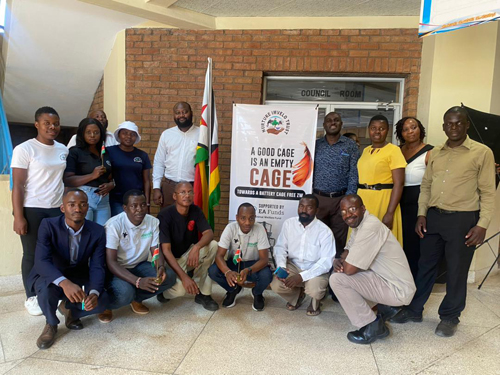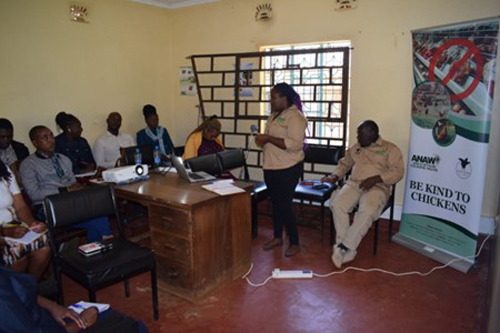Title: Campaign Towards Cage-Free Chicken Farming in Kenya and parts of Africa
Duration: March 2022 – February 2023
 The Open Wing Alliance project began in 2019/2020 to assess the current status and trends of battery cage poultry farming in Kenya, as a preliminary step to developing a nationwide campaign to promote cage-free chicken farming in Kenya. ANAW, through the first grant allocation, conducted research on the issue of chicken caged farming in Kenya in 5 counties that enabled the formation of a coalition in Kenya. The Cage-Free Coalition, formed in March 2021, brought many NGOs under one umbrella which proved much more effective in raising the issues than having only one NGO do so. The second grant in 2021 supported the expansion of the research work to 27 counties in Kenya.
The Open Wing Alliance project began in 2019/2020 to assess the current status and trends of battery cage poultry farming in Kenya, as a preliminary step to developing a nationwide campaign to promote cage-free chicken farming in Kenya. ANAW, through the first grant allocation, conducted research on the issue of chicken caged farming in Kenya in 5 counties that enabled the formation of a coalition in Kenya. The Cage-Free Coalition, formed in March 2021, brought many NGOs under one umbrella which proved much more effective in raising the issues than having only one NGO do so. The second grant in 2021 supported the expansion of the research work to 27 counties in Kenya.
The areas explored included working with farmers to know the status of cage farming, researching the policies and legislation present in Kenya, and researching consumers’ perceptions of caged chicken farming. It was evident that battery cages continued to gain popularity both in urban and peri-urban areas of the country. The study showed that the government had no policy or laws in place on eliminating battery cages in Kenya, but instead promoted them as an income-generating venture for youths and investors in the country. Furthermore, ANAW established that eggs from caged hens are both sold by large corporates such as in supermarkets/grocery stores, at open-air markets, and in small family-owned shops located in estates/suburbs.
From these findings, ANAW found it paramount to continue to phase three of the Open Wing Alliance which aims to achieve a ban of battery cages in Kenya and some parts of Africa (Zimbabwe, Malawi and Nigeria) by using various strategies targeting corporates, educating the consumers and public, strengthening the Coalition earlier formed in order to join efforts in the campaign, and finally working with the media to report the immense suffering caged hens undergo as opposed to promoting battery caged chickens as a profitable venture.
The specific objectives of the project include: 
- Develop and implement a corporate strategy towards battery cage-free eggs commitments in Kenya. Some of the activities will include
- Developing a comprehensive corporate strategy.
- Identifying and mapping all companies/corporates (supermarkets and restaurants) that sell eggs or egg-products in the country and large-scale egg farmers and suppliers.
- Targeting companies/corporates to commit to cage-free eggs policies.
- Intensify public and consumer education and awareness campaigns. A comprehensive two-year Outreach Strategy will be developed targeting the following target groups: small scale business, consumers, University students and academicians, mainstream Media Houses and social media campaigns targeting the youths who receive funds from government to start venture in eggs production.
- To strengthen the Cage-free Coalition of Kenya. This will entail working with national and international organizations that would solidify the efforts in campaigns against battery cages in the country. The activities include;
- Developing structures of a successful coalition that would be a model to other African countries.
- Developing and implementing a comprehensive campaign and awareness strategy among the organizations.
- Developing a common database / an information sharing platform for the coalition members.
- Implement African Corporate Strategic Plan with other OWA members across the continent, with the following activities:
- Support in compiling research finding related to battery cages in Africa (Case Study – Nigeria, Zimbabwe and Malawi).
- Champion the development of a common database for sharing resources such corporates and research information.
- Support in media campaigns against battery cages in Africa.
Achievements expected at the end of the project include;
- Increased public and consumer education campaigns in Kenya and parts of Africa.
- Achieved a cage-free commitment from the identified corporates.
- Developed structures that would lead to the success of the coalition including a document detailing the running of the coalition with defined roles of each organization in promoting cage-free chicken.
- Have a common database of OWA Members for research findings related to battery cages / cage-free studies in Africa.
